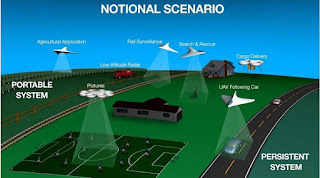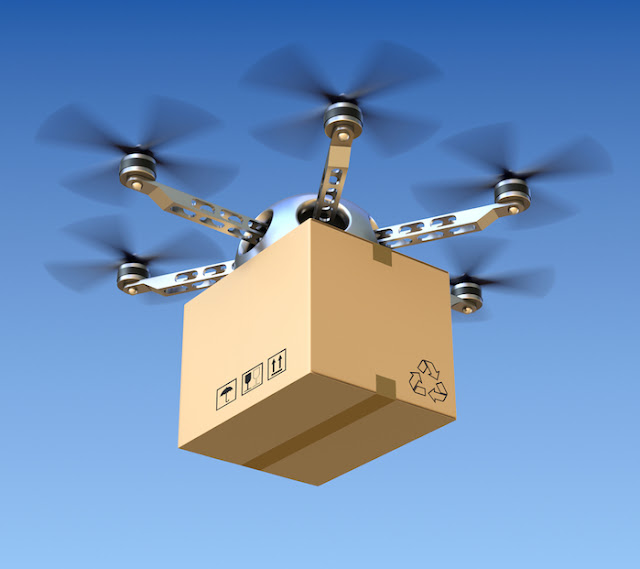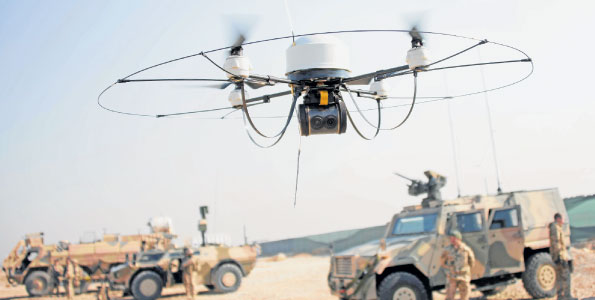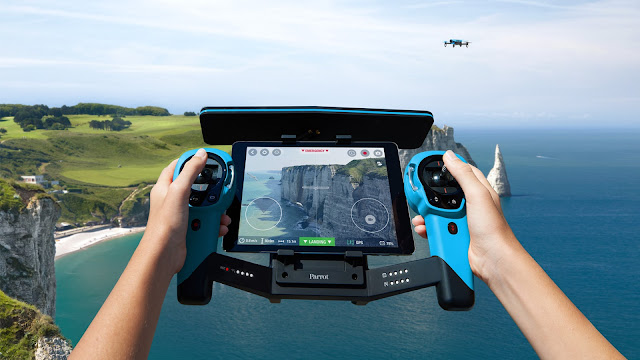A Project on Invention of Drone and It’s Multipurpose in our life with advantages and disadvantage
Definitions of Drone
A
drone, is a technological context, is an unmanned aircraft.
An unmanned aerial
vehicle (UAV), commonly known as a drone. Essentially, a drone is a
flying robot. The aircraft may be remotely controlled or can fly
autonomously through software-controlled flight plans in their embedded
systems working in conjunction with GPS. Drones are sometimes
controlled by onboard computer systems. They can also be controlled with radio
signals send by humans on the ground or in other aircrafts.
History of invention
In 1959, the U.S. Air Force, concerned about losing
pilots over hostile territory, began planning for the use of unmanned
aircraft.[13] Planning intensified after the Soviet Union shot down a U-2 in
1960. Within days, a highly classified UAV program started under the code name
of "Red Wagon".[14] The August 1964 clash in the Tonkin Gulf between
naval units of the U.S. and North Vietnamese Navy initiated America's highly
classified UAVs (Ryan Model 147, Ryan AQM-91 Firefly, Lockheed D-21) into their
first combat missions of the Vietnam War.[15] When the Chinese government [16]
showed photographs of downed U.S. UAVs via Wide World Photos,[17] the official
U.S. response was "no comment".
The War of Attrition (1967-1970) featured
the introduction of UAVs with reconnaissance cameras into combat in the
Middle East.
In the 1973 Yom Kippur
War Israel used drones as decoys to spur opposing forces into wasting
expensive anti-aircraft missiles.
In 1973 the U.S. military officially confirmed that
they had been using UAVs in Southeast Asia (Vietnam).Over 5,000 U.S. airmen had
been killed and over 1,000 more were missing or captured. The
USAF 100th Strategic Reconnaissance Wing flew about 3,435 UAV
missions during the war at a cost of about 554 UAVs lost to all causes. In
the words of USAF General George S. Brown, Commander, Air Force
Systems Command, in 1972, "The only reason we need (UAVs) is that we don't
want to needlessly expend the man in the cockpit." Later that year,
General John C. Meyer, Commander in Chief, Strategic Air Command,
stated, "we let the drone do the high-risk flying ... the loss rate
is high, but we are willing to risk more of them ... they save
lives!“
During the 1973 Yom Kippur War,
Soviet-supplied surface-to-air missile batteries
in Egypt and Syria caused heavy damage to Israeli fighter
jets. As a result, Israel developed the first UAV with real-time surveillance.
The images and radar decoys provided by these UAVs helped Israel
to completely neutralize the Syrian air defenses at the
start of the 1982 Lebanon War, resulting in no pilots downed. The first
time UAVs were used as proof-of-concept of super-agility post-stall
controlled flight in combat-flight simulations involved tailless, stealth
technology-based, three-dimensional thrust vectoring flight control,
jet-steering UAVs in Israel in 1987.
With the maturing and miniaturization of applicable
technologies in the 1980s and 1990s, interest in UAVs grew within the higher
echelons of the U.S. military. In the 1990s, the U.S. DoD gave a contract
to AAI Corporation along with Israeli company Malat. The U.S. Navy bought
the AAI Pioneer UAV that AAI and Malat developed jointly. Many of these UAVs
saw service in the 1991 Gulf War. UAVs demonstrated the possibility of
cheaper, more capable fighting machines, deployable without risk to aircrews.
Initial generations primarily involved surveillance aircraft,
but some carried armaments, such as the General Atomics MQ-1
Predator, that launched AGM-114 Hellfire air-to-ground missiles.
CAPECON was a European Union project
to develop UAV's, running from 1 May 2002 to 31 December 2005.
As of 2012, the USAF employed 7,494 UAVs - almost
one in three USAF aircraft. The Central Intelligence Agency also
operated UAVs.
In 2013 at least 50 countries used UAVs. China,
Iran, Israel and others designed and built their own varieties.
Drone
Technology
v FPV
(First Person View) Drone Technology
FPV means is “First Person View” which means a
video camera is mounted on the unmanned aerial vehicle and broadcasts the live
video to the pilot on the ground so the pilot is flying the aircraft as if
he/she was on-board the aircraft instead of looking at the craft from the
pilot’s actual ground position. FPV allows the unmanned aircraft to fly much
higher and further than you can from the looking at the aircraft from the ground.
FPV control allows for more precise flying around obstacles especially with
unmanned aerial vehicles which can easily fly indoors and through forests via
FPV where you would not be able to see obstacles from a fixed position.
v Flight
Assistant Port
The flight control system communicates with a PC
Assistant through a Micro-USB cable. This allows configuration of the UAV and
upgrade the firmware.
v UAV
Remote Control System
This is the wireless communication device using the
5.8 GHz frequency band. The drone and the remote control system should already
be paired when it leaves the factory.
v Range
Extender UAV Technology
This is a wireless communication device which
operates within the 2.4 GHz frequency. It is used to extend the range of
communication between a smart-phone and the drone in an open unobstructed area.
Transmission distance can reach up to 700 meters. Each range extender has
a unique MAC address and network name (SSID).
v Smartphone
App Featuring Ground Station Function
Smartphone App from Google Play or the Apple Store .
The app allows for full control of the drone. There is a specific feature
called ground station function on the Phantom 2 Vision+ quad copter. This
allows for flight missions by placing location waypoints and setting waypoint
altitude and overall speed. The UAV should the be able to execute the flight
mission automatically.
How Drones Work:
A typical unmanned
aircraft is made of light composite materials to reduce weight and increase
maneuverability. This composite material strength allows military drones to cruise at extremely high altitudes. Drones
are equipped with different state of the art technology such as infra-red
cameras(military UAV), GPS and laser (military UAV). Drones can be controlled
by remote control system or a ground cockpit. Drones come in a wide variety of
sizes, with the large drone mostly used for military purposes such as the
Predator drone, other smaller drones which can be launched by hand, to other
unmanned aircraft which require short runways. An unmanned aerial vehicle
system has two parts, the drone itself and the control system.
The nose of the unmanned
aerial vehicle is where all the sensors and navigational systems are present.
The rest of the body is complete innovation since there is no loss for space to
accommodate humans and also light weight. The engineering materials used to
build the drone are highly complex composites which can absorb vibration which
decreases the noise produced.
The Drone and it’s multiple use in our Life
 |
Fig: National scenari |
Drones have the potential to transform the
world for the better. In the UK, the emergency services have started to use
them to help people in danger, while the defence industry is exploring how
drones can improve security.
Around the world, wildlife
conservationists are embracing the technology to monitor animals and
any potential threats against them by using drones.
European emergency services are being trained
on how to use consumer drones in rescue operations and emergencies, including
chemical spills, car accidents and widespread fires.
Ireland's Donegal
Mountain Rescue Team has been using advanced drone software to help
coordinate search and rescue missions in remote areas, while
the Greater Copenhagen Fire Department in Denmark will be taught how
to use drones to combat fires, chemical accidents and pile ups in both urban
and over-water conditions.
Nothing strikes a strong nation more than a devastating
natural disaster, when lives are lost, homes are lost and businesses are ruined
for good. But drones have already been put to the test to assist with these sort of incidents, with the earthquake
in Haiti being a great example. The US Government used drones to look for
survivors and transport medication, protecting its troops from any danger.
Another
useful thing we can do with drones is help protect Earth’s wildlife by
monitoring it from afar, especially with endangered species. This has already
been put to the test by a team of Indonesian scientists
,who have used drones to spy on a group of endangered apes, ensuring
they are living well and are accessing the correct vegetation.
Amazon
has showcased a prototype drone aimed at getting packages to its
customers within 30 minutes.
The drone is part of Amazon's future delivery
system known as Prime Air, where several different drones will be
deployed for package deliveries.
The launch date remains unknown, but
according to the new Prime Air micro site, the drones are being developed in
the United States, the United Kingdom and Israel and being tested in
"multiple international locations."
In 2013, Domino's released footage purporting
to show tests of a remote-controlled pizza delivery and in 2014, a Russian pizza chain
delivered by drone.
The rise of drone technology for deliveries
raises the question of whether we will need to leave the house to go to the shops
ever again
Oil is
a crucial resource, vital to the survival of many economies and mankind in
general. Getting hold of it in the first place is generally
dangerous, but don’t worry, as drones are already bein used to make sure oil rigs are in tip-top condition
and functioning as they ought to.
This
technology use for modern war. It helps us to war without soldier. The most
obvious advantage of drones is that they greatly reduce putting military
personnel in harm’s way or in combat.
to their size, unlike manned aircraft, drones are able to fly into areas that were once not possible. They can fly from only a few centimeters of the ground to 400 feet in the air as one long continuous shot, whilst panning and framing a chosen subject. Drones can fly from inside a room and out through a window or door, giving the aerial film makers a very unique shot. Furthermore, they can rotate on the same spot, move left, right up or down, all at the touch of the pilot’s command, whilst giving the camera operator total autonomy to position the camera to frame the perfect shot.
Fig:
Full HD Quality
3D maps

Fig: 3D maps

 Construction sites are utilizing them to present
their work from a different perspective to prospective clients, as well as
generating 3D maps. The drones are also able to generate maps from a series of
photos that can then be run through software that will allow the user to
measure distances or volumes without having to physically be on site.
Construction sites are utilizing them to present
their work from a different perspective to prospective clients, as well as
generating 3D maps. The drones are also able to generate maps from a series of
photos that can then be run through software that will allow the user to
measure distances or volumes without having to physically be on site.
Law enforcement



Fig: Search
UAS can be used to search for lost children, provide
tactical surveillance and suspect tracking, assist in accident investigations and monitor large crowds.
Contribute to safe infrastructure
maintenance and management

Fig:
Risky place
Consider the difficulty of inspecting the underside
of a bridge or the top of a skyscraper, not to mention the costs and risks.
With UAS, scaffolding, cranes, or harnesses are not required. Just deploy the
system to assess the structure's condition remotely
Network Rail

Fig:
Network Rail
Network
Rail’s ORBIS project, which will see the railways in the UK digitised with 3D
cameras and visualized online to analyze maintenance and field worker
distribution. It currently uses aerial cameras but would like to use drones to
get a better picture of the transport networks.
BBC and
other British Media
Fig: BBC and other British Media
Media outlets like the BBC and Al Jazeera have begun
using drones to film overhead – but with some undesirable consequences. Three
BBC journalists were questioned after breaching high-level security protocols
in Davos for the World Economic Forum, and Parisian police arrested three Al
Jazeera reporters after their drone was spotted in the Boi de Boulogne skies.
Risky side of Drone in our life
Fig:
Risky side of Drone
Drones also have the power to transform the
world for the worse. While they have been used to protect against security
threats, they have the capacity to be used as a deadly weapon.
While still early days, the use of unmanned flying
objects is set to change the world in which we live.
Some have also bemoaned the use of
drones for spying and surveillance. But, as others have argued, does it really
matter if you're not doing anything wrong?
Drone Traffic Regulations

Fig:
Drone Traffic Regulations
Gone are the
days of being able to fly a drone at will, even now, you have to follow the law
of the land. Moving forward authorities will be turning their attention to
drones specifically and the space will become increasingly regulated.
Drone Hijacking

Fig: Drone Hijacking
With Amazon and Dominoes looking at using Drones in their
SCM cycle, it is feasible that soon there will be large amounts of goods being
moved by drone. It’s only a matter of time before someone tries to hijack your
drone for a free pizza or a free I pad.
The end of the “We have something for you”
card

Fig: The end of the “We have something for you” card
With a
drone’s ability to deliver day or night, at a time of your convenience, gone
are the days of having to re-arrange a courier or visit your local Royal Mail
depot with a “we have something for you” card.
Last mile disruption
Last mile courier companies, who deliver from
final transport hub to final destination, will be massively affected by drones,
with short deliveries now made even easier by drones.
No more clear skies
Our
skies are no longer going to be empty wide spaces of blue or grey (in the case
of London), they are going to be a chockablock ‘drone ways’.
Make room for drone stations

Fig: drone stations
With the
widespread use of drones, we should expect the introduction of drone docking
station in our cities and towns. These are places to for drones to
refuel/recharge, as well as pick up and drop off goods.
Drone terrorism

Fig: Drone terrorism
Cyber terrorism and crime is on the rise, and with more and more drones
in the air, there is potential for these to be hijacked for terrorist use. The
payload doesn’t even need to be explosive, fast and heavy flying objects can do
enough damage by themselves.
Drone economics
The
economics of drones is going to govern and affect a lot of decisions in the
retail market. This will in turn have an impact on the price of commodities.
Drone throne
A more
light hearted possibility is the idea of drone wars and drone gaming, pitting
drones against each other as a sport.
The
applications and possibilities engendered by drones are endless, and merely
limited by our own imagination. How do you think drones will impact society?
Employment

Drones
have the potential to supersede large amounts of courier roles, and there is
the possibility that there will be many redundancies. Conversely there will be
a need for more technically skilled people to manage and maintain an efficient
drone delivery network. Whether the UK has the labor pool for this type of work
is up for debate.
Deadly weapon

Fig: Deadly weapon
Any weapon which can kill. This includes not only weapons which are intended to do harm like a gun or knife, but alsoblunt instruments like clubs, baseball bats, monkey wrenches, an automobile object which actually causes death.This becomes important when trying to prove criminal charges brought for assault with a deadly weapon. In a few 1990scases courts have found rocks and even penises of AIDS sufferers as "deadly weapons”.
Suicide Drones

Fig: Suicide Drone
The first known use of a "suicide drone"
is believed to have taken place during the recent fighting between
Azerbaijan and Armenia.
Azerbaijani forces are thought to have deployed
a drone tipped with explosives and crashed it into its target, rather
than firing a missile.
The drone slammed into a bus carrying Armenian volunteer
soldiers and killed seven people, according to the Armenian
defiance ministry.
Fighting
periodically breaks out between Azerbaijan and Armenia over Nagorno-Karabakh, a
self-declared Armenian republic that lies within the internationally recognized
borders of Azerbaijan
Security threat
The number of reported near-misses between
drones and planes is on the rise. In the first four months of 2016, there were
15 reported near-misses, according to a Freedom of Information request.
Pilots have called for better safety
regulation to prevent a collision as the risk remains "unacceptably
high".
In April, a British Airways flight was hit by
a suspected drone. Transport minister Robert Goodwill
later admitted authorities had not yet confirmed whether what struck the
Airbus A320 was a remote-controlled device - and that it may have actually been a
plastic bag.
Although the aircraft landed intact and was
later cleared for its next flight, it has renewed calls for more to be done to
curb drone use
Passengers were terrified by a "huge
bang" when the drone hit the rear carriage of the train on preserved
railway tracks between Grosmont and Pickering. Luckily, in this
case no damage or injuries were caused
Spying and monitoring

Fig: Spying and monitoring
TV presenter Richard Madeley reported to the police two "peeping
Toms" who were allegedly flying a drone over his garden to spy on him.
The former This Morning host, who was wearing
just a pair of beach shorts at the time, said he gave chase to the
"creeps" and located the suspected owners in a nearby white van,
before contacting his local police force in Cornwall .
He told The Telegraph: "I would
never dream of going out anywhere I might be photographed dressed like that –
yet here, in my entirely private space, I was under surveillance, for who
know’s what purpose. For me, this was a red line crossed."
The drone's owner has denied spying on Medley.
Drones are also being used by councils in
England to fly over the homes of people seeking planning permission. A Freedom of Information survey of hundreds of councils found
that a dozen had admitted to using or hiring drones. Two councils
said the drones could be used to check on planning applications.
The revelation raised questions over
privacy. The Liberal Democrats called for a code of practice to govern
how councils use drones while the information watchdog said it
was “concerned” by the news and said councils should consider whether
drones were “necessary and proportionate”
Recommendation










